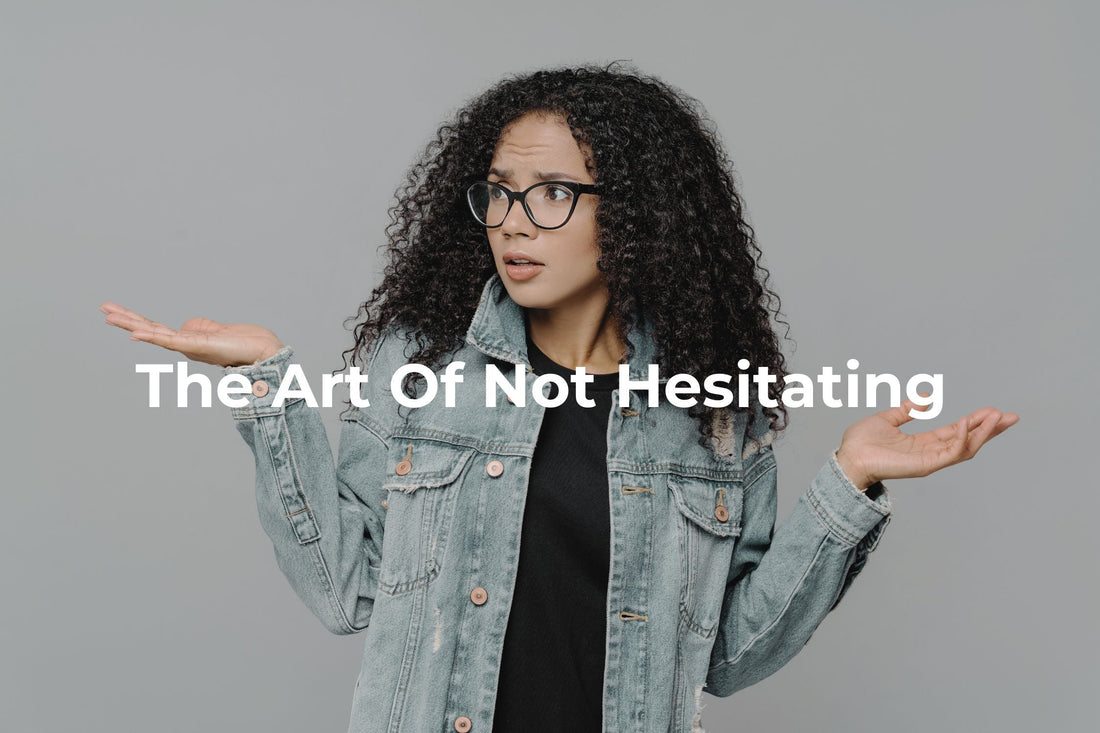
The Art of Not Hesitating
It happens in an instant, so fast that most people don’t even notice it’s the turning point.
A stranger’s eyes meet yours across the room, and something deep in your gut tells you to walk over. The phone pings with an opportunity that excites you and scares you at the same time, and your hand hovers over the reply button. A business idea shakes you awake in the middle of the night, so vivid you can almost hear it breathing, and for a moment, you can see the life it could give you.
And then you pause.
You tell yourself you’re just being careful. You’ll act later, when the timing is better. But in that breath between impulse and movement, the thread connecting you to that moment begins to fray. This is how most people lose the best things in their lives not by failing, but by hesitating.
Hesitation Feels Safe. It Isn’t.
Hesitation is polite. It presents itself as caution, maturity, and wisdom. It reassures you that you’re protecting yourself from embarrassment or disappointment. It promises you that you’re not saying “no,” you’re simply saying “not yet.”
But hesitation is a thief with a gentle hand. It doesn’t just take the chance in front of you, it steals the version of your life that could have grown from that chance.
You’ve felt it. The stranger you didn’t approach. The meeting where you swallowed your idea because you weren’t sure it was good enough. The job application you left half-finished because your résumé didn’t feel perfect yet only to find the posting gone the next day.
This is where Mel Robbins’ The 5 Second Rule hits hard: the longer you wait, the less likely you are to act. Her method, counting down from five and moving before doubt has time to speak exists for this exact moment. It’s a tool for killing hesitation before it kills your opportunity.
How We Lose People Before We Meet Them
We think connection is about luck or fate, but often it’s about nerve.
That person in the café who smiled at you could have been a friend, a collaborator, a partner. That person at the conference who lingered near you might have been your next client or investor. But you waited for the perfect line, the perfect timing, the perfect proof that they wanted you to approach.
While you were waiting, someone else moved.
If you struggle with making that first move because you want it to be flawless, Brené Brown’s Daring Greatly is a masterclass in acting while exposed. She’ll remind you that vulnerability, not perfection is what forges the connections that change your life.
The Vanishing Nature of Ideas
Ideas are alive. They have a pulse, a heat, and a natural expiration date. Ignore them, and they’ll leave.
You’ve had one. The business, the blog, the store, the book. You named it in your head. You pictured the logo. You knew exactly who it would serve. And then you decided to “wait until you’re ready.”
Weeks later, the energy had faded. Months later, someone else had launched something eerily similar. They weren’t necessarily more talented. They were simply faster to act.
Steven Pressfield’s The War of Art exists for exactly this moment the fight against “Resistance,” his word for the force that makes us wait, polish, and procrastinate until the idea rots. Read it if you’ve ever wondered why you can think about something for years and never start.
The Lie of the Right Time
We love the fantasy of the perfect moment. We picture ourselves in control, fearless, certain. We imagine beginning only when we feel steady. But readiness is a myth.
The first day at the gym will feel awkward. Ending the relationship you’ve outgrown will feel raw and messy. Posting your work will feel like peeling back your skin in public. That’s the point.
Ryan Holiday’s The Obstacle Is the Way reframes discomfort as the doorway to progress. You’re not supposed to feel ready, you’re supposed to feel resistant and go forward anyway.
Fear Leaves. Regret Stays
Fear is loud in the moment. It pounds in your chest, clouds your thoughts, and convinces you to stop. But fear is fleeting.
Regret is patient. It waits until life has quieted, then reminds you what you didn’t do. You will forget the fear. You will not forget the moment you lost.
If you tend to get trapped in cycles of hesitation because you “need to get organized first,” James Clear’s Atomic Habits will help you break that pattern. By focusing on tiny, repeatable actions, you bypass the waiting game entirely and make movement your default state.
The Case for Moving Now
There will always be reasons to wait. They will sound intelligent and responsible. But the stranger will walk away. The job posting will close. The idea will fade. The opportunity will move on.
Cal Newport’s Deep Work will teach you how to create conditions where hesitation can’t thrive by cutting distraction, building rituals, and committing blocks of time to meaningful action instead of overthinking.
And if you need one more nudge, Darius Foroux’s Do It Today strips away every excuse and reduces it to this: the work you want to do, the life you want to live, begins the moment you stop putting it off.
When the moment comes and it will, move. Speak. Apply. Begin. Not because it’s safe, not because you’re certain, but because the alternative is a life of untouched possibilities.
And if you must look back, let it be to smile at the chaos you created, not to mourn the life you never touched.
